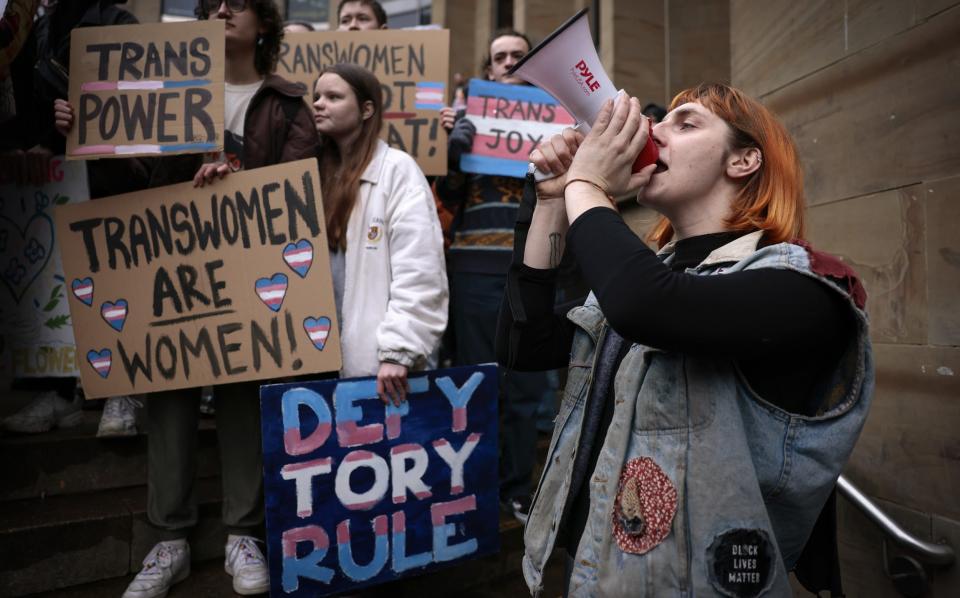UK Government wins legal battle to veto Nicola Sturgeon’s self-ID law

The UK Government acted lawfully by vetoing Nicola Sturgeon’s self-ID gender laws, a senior judge has ruled in a “humiliating” defeat for SNP ministers.
The Court of Session said Alister Jack, the Scottish Secretary, was within his rights to block the Gender Recognition Reform (GRR) Bill, despite it being passed by MSPs.
In a 65-page judgment, Lady Haldane rejected claims made by the Scottish Government that Mr Jack had acted irrationally and could not justify his concern the legislation would undermine UK-wide protections for women.
Ms Sturgeon and Humza Yousaf, her successor, had claimed that Mr Jack’s use of the veto power demonstrated that Westminster could overrule any Holyrood legislation it wished.
But Lady Haldane said that the veto power was an “intrinsic part” of the Scotland Act that created devolution and it was “not an unfettered one” as it required “certain preconditions being fulfilled”.
Responding on social media, Mr Yousaf said it was a “dark day for devolution” and his government would “take time” to consider the court’s findings before deciding whether to appeal.
He has 21 days to decide whether to take the case to the Inner House of the Court of Session, which is Scotland’s highest civil court. If the Scottish Government lost again, it could appeal to the UK Supreme Court.
However, Mr Jack welcomed the ruling and urged the First Minister to “stop wasting taxpayers’ money pursuing needless legal action”.

Mr Yousaf’s administration has spent more than £230,000 of public money on the legal fight and it is understood Mr Jack is keen to recover the UK Government’s costs, which also run into six figures.
It is the latest in a series of high-profile court cases the Scottish Government has lost, including the UK Supreme Court ruling last year that Holyrood does not have the power to stage an independence referendum.
The GRR Bill would allow Scots to change their legal gender by simply signing a statutory declaration, dropping the requirement for a formal medical diagnosis of gender dysphoria.
It would also drastically lower the time period in which someone must live in their “acquired gender” from two years to as little as six months and allow 16 and 17-year-olds to obtain gender recognition certificates (GRCs) for the first time.
Mr Jack made an order under Section 35 of the Scotland Act to prevent the legislation getting Royal Assent – the first time this power had ever been used.
He argued the legislation undermined UK-wide protections for women, including the sanctity of female-only safe spaces.
There was a huge public backlash against the reforms after trans predator Isla Bryson was initially sent to a women’s prison after being convicted of two rapes.
After succeeding Ms Sturgeon as First Minister, Mr Yousaf pressed ahead with a petition for judicial review of the decision despite legal experts warning he had little chance of success. The case was heard before Lady Haldane in September.

Mr Yousaf tweeted: “Today’s judgment confirms beyond doubt that devolution is fundamentally flawed. The Court has confirmed that legislation passed by a majority in Holyrood can be struck down by Westminster.
“The only way to guarantee we get true self-government is through independence. This is a dark day for devolution. Sovereignty should lie with the people of Scotland, not a Westminster government we didn’t vote for with the ability to overrule our laws.”
However, he insisted that SNP ministers “respect the Court’s judgment and will take time to consider its findings.”
Mr Jack said: “I was clear that this legislation would have had adverse effects on the operation of the law as it applies to reserved matters, including on important Great Britain-wide equality protections.
“Following this latest court defeat for the Scottish Government, their ministers need to stop wasting taxpayers’ money pursuing needless legal action and focus on the real issues which matter to people in Scotland – such as growing the economy and cutting waiting lists.”
Meghan Gallacher, Scottish Conservative deputy leader, said: “This is a humiliating defeat for Humza Yousaf and the SNP, who have once again squandered taxpayers’ cash on a self-serving but doomed court case.
“Their reckless Gender Recognition Reform Bill is deeply unpopular with the Scottish public because its self-ID principle compromises the safety of women and girls – as the case of a double-rapist being sent to a female prison demonstrated.”

Lord Advocate Dorothy Bain KC, the Scottish Government’s most senior law officer, told the Court of Session in September that the reasons used by Mr Jack to justify the veto were “theoretical” and “very unlikely to arise in practice”.
She argued the evidence base he used before making the decision was too narrow and argued that he had really blocked the legislation because he disagreed with the self-ID policy.
Claiming that he had acted unlawfully, she said a Scottish gender recognition certificate issued under the self-ID system would be “of no effect elsewhere in the UK”.
But Lady Haldane rejected her arguments, stating that the documents submitted in the case do “not support the inference or conclusion that a policy disagreement lay behind the making of the Order.”
The judge also threw out Ms Bain’s claim that the Bill had no impact on UK-wide equalities laws and this meant that “the first precondition” for using the veto was met.
Lady Haldane noted that “the whole purpose” of the legislation was to “widen the category of those who may apply” for a GRC “and to simplify the overall process by which a certificate may be obtained”.
Rejecting the claim that Mr Jack had acted irrationally, she said he had received advice and information on whether a veto would be lawful and “to what extent adverse effects were anticipated” from the Bill.
These included a submission from Reem Alsalem, UN Special Rapporteur on violence against women and girls, its causes and consequences.
Although not “exhaustive”, Lady Haldane said Mr Jack was “constrained” by the four-week deadline he had for issuing a veto and the approach he took was “reasonable in all the circumstances”.

The Scottish Secretary received only one “submission of significance” supporting the Bill but the judge noted that the “fundamental question before him was different from that faced by the Scottish Parliament”.
Rather than balance the pros and cons of the legislation, she said his task was “to be satisfied... whether any adverse effects could in fact be identified, justifying intervention in the manner proposed.”
Speaking on behalf of Labour, which voted for the legislation, Ian Murray, the shadow Scottish secretary, said: “It is disappointing this legislation ended in the courts but this ruling should be respected.”
Vic Valentine, manager of charity Scottish Trans, said: “We are really concerned that this judgement, if left unchallenged, means that trans people will continue to have to use the intrusive, unfair and expensive process for being legally recognised as who we truly are that a majority of MSPs voted to significantly improve last year – and so we urge the Scottish Government to appeal.”


